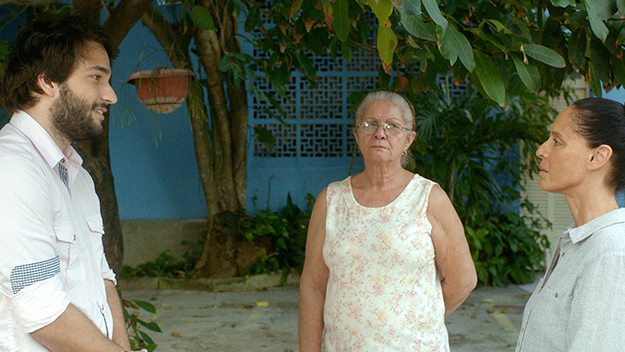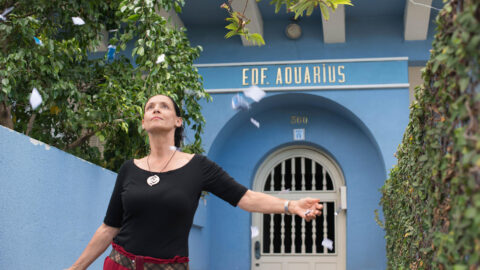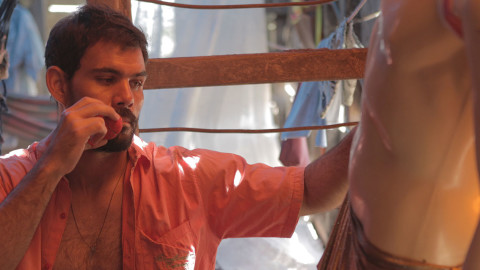NYFF: The Aquarius Letters
Brazilian standout Aquarius screens October 9 and 11 in the 54th New York Film Festival, following an acclaimed premiere at Cannes, governmental upheaval in Brazil, and political controversy regarding the film’s thwarted chance of vying for the Academy Award. Film Comment critic Yonca Talu corresponded with the director of Aquarius, Kleber Mendonça Filho, about the film and his recent experiences. Their exchanges are reprinted below. The film opens Friday.
Dear Kleber,
Going back to the roots of communication seems like an exciting way of talking about a film that deals so much with memory and the vestiges of time. In fact, I keep thinking of T.S. Eliot’s concept of the “historical sense” in trying to wrap my head around Aquarius. In Eliot’s words, this is the “perception, not only of the pastness of the past, but of its presence.” For me, Aquarius is exactly about this idea of the co-existence of the present and the past in regard to personal history. Clara’s whole struggle is shaped by the belief that the simple act of remembrance can trigger transformation, and revitalize a tarnished present that has been deprived of its essence, of its “historical sense,” so to speak.
The film has sparked a lot of introspection for me, but I would like to seize the moment by asking you to walk me through your experience of releasing the film in Brazil and all the controversy that has surrounded it, including the censorship and the Oscar selection process. In some ways, Clara’s journey of resistance in the film has found a counterpart in your personal journey as a filmmaker, while also echoing, in a fictional realm, the impeachment process that has paralyzed and polarized your country for months.
I am fascinated by this mise en abyme effect that your film has produced, and the questions it brings up about the interplay of reality and fiction in cinema. As a filmmaker, how do you go about fictionalizing tensions you perceive in society, and what do you make of the fusion of fiction and reality that has emerged around Aquarius?
Yonca

Dear Yonca,
Much of what has been written and discussed about Aquarius’s tumultuous release in Brazil—and this is of course, beyond discussing the film itself as a film—has focused on words like “struggle”, “tensions,” and even “retaliation,” words normally associated with the political arena and not so much with the film world. I actually believe that these words do come up every now and then in the arts, for books, plays, films, but they are not, by definition, what you would normally expect when a film, a work of fiction and cinema language, is about to be released. So, I would like to point out that there has been a huge amount of support and love for Aquarius in Brazil and also for our political views on the current state of Brazilian politics. It would have been impossible to actually get the film out if the whole scenario was purely hostile.
I started noticing this from the first moment, at the Cannes Film Festival, when we got massive support and also when the Brazilian right started its attacks. For three months, much was discussed about the film, for and against, without anyone actually seeing it. We started getting requests by big media to actually show them Aquarius (which we did with caution), whereas Brazilian journalists who were in Cannes would get their ideas out, all of them raving about the film. The two dissonant voices in Brazilian media came from right-wing journalists who had not yet seen Aquarius, one of them calling for a boycott on the film. The other one suggested the film’s crew attended Cannes on some sort of glamorous holiday package paid by taxpayers, sponsored by the Dilma Rousseff government so we would stage the protest. The concept of attending Cannes to present a film in competition as some sort of glamorous holiday shows how artists are currently seen by some in Brazil, and this also confirmed some of the very negative reactions Brazilian artists in general seem to be getting from the right, a complete lack of understanding of how democracy works and also on the very nature of an artist’s work, normally pictured as vagabonds, bon vivants who do not actually work like real decent people do. This was probably the most comical aspect of this whole non-discussion, though I have to say that I struggle to use the word “comical” because it is, in fact, quite sad.
Then again, for every negative reaction, there was and still is a couple of positive ones, and the path to the release of Aquarius was paved with this huge political and human energy, a cloud of ideas and admiration that seemed to grow bigger every time the film was screened in an international film festival prior to its Brazilian release date. These screenings were attended by many Brazilians who would go online and rave about the film. It happened in Sydney, Munich, Paris, Lima; it just made the whole film grow.
And, of course, the similarities between the storyline in Aquarius and Dilma’s predicament were much discussed. They are, in fact, quite staggering. When we went up the steps of the Palais des Festivals in Cannes, the impeachment process had just begun after a very ugly chain of events that felt like a weird mix of Kafka and a cheap reality show. On that same week, the new interim government pulled the plug on the Ministry of Culture, widely seen by conservatives as a safe haven for radical leftists. That lasted about a week in May and it was also part of our protest. They decided it was a bad idea to get rid of the Ministry of Culture and brought it back, just like that crazy anarchist in Airplane!, plugging and unplugging the runway lights. Tools normally offered by democracy were re-orchestrated and creatively applied to meet the needs of conservatives who grew impatient and frustrated with four defeats in 13 years in Brazil’s very democratic general elections. They had to get to power through this nonsensical impeachment process with full support from big Brazilian media, which presented an outlandish narrative where all things liberal and left were presented as rotten through and through. Some people actually believe now that corruption was a concept brought into Brazilian society by PT (Partido dos Trabalhadores, the Workers’ Party) less than 15 years ago. A fascinating case of short-term collective memory. Clara’s words in the film “Do you know when you feel mad, but you actually know you are not mad?” began to resonate strongly, and soon the story of these two women trying to resist eviction from their homes began to hit people.
The most paranormal correlation between Clara and Dilma took place in late August. The three months which topped the whole lab generated political crisis, and what would be the season finale, took place on the exact week Aquarius was coming out nationwide, and after five raucous advance screenings took place all over the country. The Recife screening, the very first one in the country, on August 20th, at the 1952 movie Palace, the São Luiz, was about the most dramatic. One thousand seats, all taken. People began to cheer and applaud from the moment Clara starts throwing pieces of rotten wood on the marble table. Everyone could tell the film seemed to be hitting a nerve; a very cathartic experience.
Aquarius opened Thursday, September 1st, 12 hours after Dilma was finally told to leave office by senators, many of them accused of corruption crimes, whereas no charges whatsoever were ever presented for Dilma herself as a politician, as a citizen, or as president. As for myself and for the group of friends who made Aquarius, we just went where the film took us. We opened the Gramado Film Festival, which was quite a big night, we had massive advance screenings in São Paulo and Rio, juggling huge media coverage (mostly supportive) through reviews, articles, and interviews. I was either reacting accordingly or just reacting with irony to two very specific, government-related attacks: the unusual 18 rating the film got from the Ministry of Justice, something that became a huge controversy and that led us to argue in very technical terms with censors that, in reality, it did not make much sense. I have to say that a whole history of film and censorship came to mind during that episode, an area of cinema I have always been very fond of, having lived in Britain during my teenage years, at the time of the video nasties. I also thought of Jose Mojica Marins (Zé do Caixão), Verhoeven, De Palma, and also, inevitably, the dictatorship years, when I was a child, in the ’70s, a time when I was not allowed to see Sonia Braga’s films in cinemas because they were all rated 18, sometimes with cuts made by the Departamento de Censura.
Kleber

Dear Kleber,
In continuation of what you said about Aquarius touching a public nerve, I would like to return to this sense of history that pervades the film. By beginning the film in 1970, with an episode that serves as a reference point for everything that follows, you take us into Clara’s past, but also your own childhood and your country’s past. In fact, the latter seems to form the unspoken foundation of the whole film, hovering over every event like a dark cloud before the storm. Even though this is never explicitly addressed in the film, Clara has been through all the major transformations of Brazilian society in the last half-century, from the presidency of Vargas to the military dictatorship up until today, and deep down she carries the wounds and the weight of all those years of censorship, corruption, and violence.
For me, the most striking image of this occurs when she enters the archives and is confronted with that decaying mess: she is so small next to those mountains of files and yet she radiates a kind of spiritual strength that eclipses the brutality and perversion they contain. Perhaps it’s because of images like this that one is tempted to read allegorical meanings into your film.
In the same vein, I was also reminded of the fireworks explosion at the end of Neighboring Sounds, and given that Aquarius also ends on a note of rage, an act of destruction this time, it seems to me that on a subtextual level (and of course coupled with the recent developments), the film depicts the end of an era, almost like a Western would depict the state of a nation. I know that for Neighboring Sounds, there was a conscious desire on your part to show the apartment block as some sort of microcosm of the country. In the case of Aquarius, how much were the writing process and the making of the film informed by an awareness of history?
Yonca

Dear Yonca,
A lot of what I do in a film, as writer and director, comes from the pleasure I will get from making the film and how I will develop and shoot scenes, sequences, shots. In my mind, it has to be a pleasurable experience for me and hopefully for everyone involved. So, it really is all about satisfaction, personal, emotional and technical, and one interesting example is that opening segment in Aquarius. First, at script stage, it felt like a letter I was writing to people I knew from the past, or to people I knew very young and who have now changed, who have grown older. And of course to those who have died, and in some ways, maybe for obvious reasons, these are the ones who move me the most. So, I had good feelings about that whole segment, it was an emotional experience for me which led me to the desire to shoot it, and that’s where the whole experience becomes a technical challenge which will enable some very personal memories to actually become something physical, or at least visual in a film.
I remember an evening like that one, as a child, or maybe I remember that party, or that party in the film is a composite of different family gatherings, most of them from families I know. I was there, and to put it together in detail, on a film set, with a budget, 36, 38 years after it happened, was quite wonderful, like trying to physically build a set of memories. Filmmakers have gone through this long before I had the chance to do this, but it was the first time I felt this. One can think of Bergman, Fellini, Truffaut, Scola, Allen, Desplechin, you know, the list is long…
I remember now that in production meetings, ideas and memories, “madeleines” from my own life and from my collaborator’s own memories would come back as we discussed T-shirts, facial hair, cigarettes and period cars, and the military regime. And of course, bits and pieces from my family or from families I know and used to know. I remember playing on that beach in the late ’70s and cars out onto the sand. Once I figured out what I wanted to actually shoot, I realized all of that worked as some sort of timeline extension for the film, which takes place in 2015, but starts in 1980 (with a strong feeling of the 1970s) and those personal memories from aunt Lucia which probably take us back to the late ’40s, or maybe the early ’50s, in some bedroom in Recife.
So, in a film about archives, and one in which we actually visit one (municipal, chaotic, paper sewage) I thought that segment in the beginning of the film should be a living archive of memories, one Saturday evening in the year 1980 where so many people were just there, living their lives, nothing truly spectacular took place (no one dies, no accidents or fires or guns are fired), but still, we get a sense of time lived. I was happy to see that one of the hundred or so articles, critiques, and texts published on Aquarius in Brazil took as a starting point one particular T-shirt seen briefly at the party in 1980, a T-shirt from Recife’s mythical book store Livro 7, the largest in Brazil at the time (it opened in 1971 and closed in 1998), and which became something of a landmark not only as a place in Recife but also as a symbol of Recife’s very peculiar personality as a cultural center. It was a place I was taken to on Saturday mornings: while my parents would go through books, me and my brother would get a chance to pick up books we wanted to read and they would pay for our selections. So, it is special to see that one T-shirt resonates like that, it seems to touch a historical, emotional nerve, even if for most people around Brazil and abroad, the T-shirt is just a T-shirt, worn by one of the housemaids in the kitchen.
About the ending that you mentioned, that seems to bring on a different kind of catharsis, less emotional and more energy-driven; it seems to work well with audiences. I actually love to experience a physical reaction in a film, that emotional knee-jerk reaction that happens very rarely in cinema, something like Viggo Mortensen reacting to those nasty men who come calling at the diner in Cronenberg’s A History of Violence, or that whole chunk of the final 25-30 minutes of Hooper’s Texas Chainsaw Massacre. Why are these reactions usually connected to violence and terror and brutality? That’s of course very tricky, but I thought we might pull it off if Clara got very violent and angry, chucking pieces of rotten, cancerous wood onto that marble table, and maybe through cutting and sound, it could feel brutal in a visual and emotional sense. I also believe that in a country where, historically, injustice is ever so present, that final sequence really kicks in. As some observers (mostly foreign, non-Brazilian) have pointed out, Clara never calls the police.
Kleber






